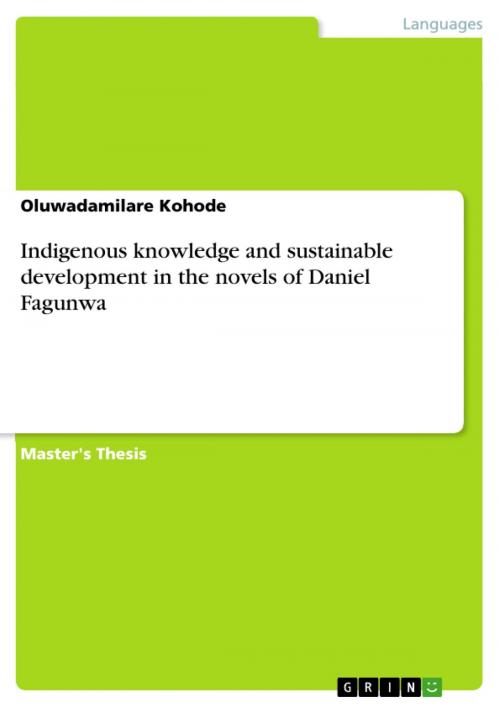Indigenous knowledge and sustainable development in the novels of Daniel Fagunwa
Fiction & Literature, Literary Theory & Criticism| Author: | Oluwadamilare Kohode | ISBN: | 9783668275676 |
| Publisher: | GRIN Verlag | Publication: | August 16, 2016 |
| Imprint: | GRIN Verlag | Language: | English |
| Author: | Oluwadamilare Kohode |
| ISBN: | 9783668275676 |
| Publisher: | GRIN Verlag |
| Publication: | August 16, 2016 |
| Imprint: | GRIN Verlag |
| Language: | English |
Master's Thesis from the year 2016 in the subject Literature - Africa, , language: English, abstract: This study reveals that Fágúnwà, in his five novels, consciously adresses the issue of sustainable development through the use of indigenous knowledge. Fágúnwà, for instance, emphasises the utilisation of the Yorùbá indigenous knowledge, such as its medicine and health care, the indigenous corpus of folktales and fables, the indigenous technology among others, for sustainable development. His inclusion of the moonlight tales in his novels is a weapon for sustainable development by inculcating the right virtues in the children and ensuring the subsistence of their indigenous culture. This will help the children to become good future leaders and members of the community. He encourages subsistence farming by all households in order to reduce hunger, unemployment and to inculcate hard work in the children. This will lead to sustainable development of self-reliance in every family. Fágúnwà also espouses relationship with neighbouring and far away towns in order to acquire more knowledge for sustainable development. He supports voyage to gain knowledge on administration, management and peaceful existence. Àkàrà Ògùn, Olówó-aiyé, Ìrèké and Àdìtú all embark on expeditions to sustain their communities. These, among others, are Fágúnwà's ways of projecting sustainable development through the Yorùbá indigenous knowledge. Hence, this study concludes that Fágúnwà's novels, through its reflection of the Yorùbá indigenous knowledge, project sustainable development. This means the Yorùbá indigenous knowledge if well employed will aid sustainable development. Therefore, the focus of this study on the reflection of indigenous knowledge and sustainable development in Fágúnwà novels, is believed, will instigate scholars to study more on the concept of indigenous knowledge, its significance and relevance to sustainable development.
Master's Thesis from the year 2016 in the subject Literature - Africa, , language: English, abstract: This study reveals that Fágúnwà, in his five novels, consciously adresses the issue of sustainable development through the use of indigenous knowledge. Fágúnwà, for instance, emphasises the utilisation of the Yorùbá indigenous knowledge, such as its medicine and health care, the indigenous corpus of folktales and fables, the indigenous technology among others, for sustainable development. His inclusion of the moonlight tales in his novels is a weapon for sustainable development by inculcating the right virtues in the children and ensuring the subsistence of their indigenous culture. This will help the children to become good future leaders and members of the community. He encourages subsistence farming by all households in order to reduce hunger, unemployment and to inculcate hard work in the children. This will lead to sustainable development of self-reliance in every family. Fágúnwà also espouses relationship with neighbouring and far away towns in order to acquire more knowledge for sustainable development. He supports voyage to gain knowledge on administration, management and peaceful existence. Àkàrà Ògùn, Olówó-aiyé, Ìrèké and Àdìtú all embark on expeditions to sustain their communities. These, among others, are Fágúnwà's ways of projecting sustainable development through the Yorùbá indigenous knowledge. Hence, this study concludes that Fágúnwà's novels, through its reflection of the Yorùbá indigenous knowledge, project sustainable development. This means the Yorùbá indigenous knowledge if well employed will aid sustainable development. Therefore, the focus of this study on the reflection of indigenous knowledge and sustainable development in Fágúnwà novels, is believed, will instigate scholars to study more on the concept of indigenous knowledge, its significance and relevance to sustainable development.















